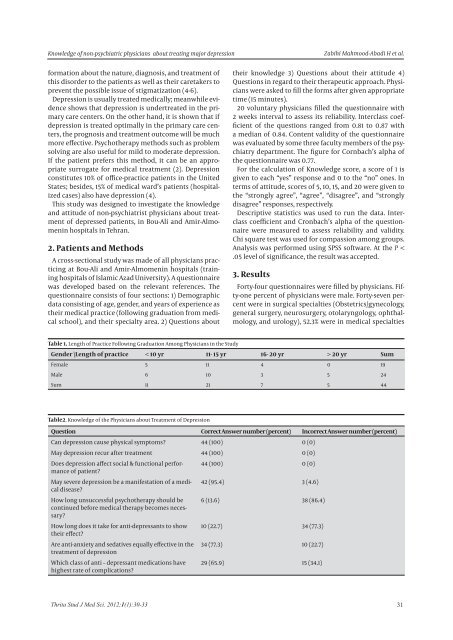by Author Index by Keywords - Index of
by Author Index by Keywords - Index of
by Author Index by Keywords - Index of
You also want an ePaper? Increase the reach of your titles
YUMPU automatically turns print PDFs into web optimized ePapers that Google loves.
Knowledge <strong>of</strong> non-psychiatric physicians about treating major depression Zabihi Mahmood-Abadi H et al.<br />
formation about the nature, diagnosis, and treatment <strong>of</strong><br />
this disorder to the patients as well as their caretakers to<br />
prevent the possible issue <strong>of</strong> stigmatization (4-6).<br />
Depression is usually treated medically; meanwhile evidence<br />
shows that depression is undertreated in the primary<br />
care centers. On the other hand, it is shown that if<br />
depression is treated optimally in the primary care centers,<br />
the prognosis and treatment outcome will be much<br />
more effective. Psychotherapy methods such as problem<br />
solving are also useful for mild to moderate depression.<br />
If the patient prefers this method, it can be an appropriate<br />
surrogate for medical treatment (2). Depression<br />
constitutes 10% <strong>of</strong> <strong>of</strong>fice-practice patients in the United<br />
States; besides, 15% <strong>of</strong> medical ward’s patients (hospitalized<br />
cases) also have depression (4).<br />
This study was designed to investigate the knowledge<br />
and attitude <strong>of</strong> non-psychiatrist physicians about treatment<br />
<strong>of</strong> depressed patients, in Bou-Ali and Amir-Almomenin<br />
hospitals in Tehran.<br />
2. Patients and Methods<br />
A cross-sectional study was made <strong>of</strong> all physicians practicing<br />
at Bou-Ali and Amir-Almomenin hospitals (training<br />
hospitals <strong>of</strong> Islamic Azad University). A questionnaire<br />
was developed based on the relevant references. The<br />
questionnaire consists <strong>of</strong> four sections: 1) Demographic<br />
data consisting <strong>of</strong> age, gender, and years <strong>of</strong> experience as<br />
their medical practice (following graduation from medical<br />
school), and their specialty area. 2) Questions about<br />
Thrita Stud J Med Sci. 2012;1(1):30-33<br />
their knowledge 3) Questions about their attitude 4)<br />
Questions in regard to their therapeutic approach. Physicians<br />
were asked to fill the forms after given appropriate<br />
time (15 minutes).<br />
20 voluntary physicians filled the questionnaire with<br />
2 weeks interval to assess its reliability. Interclass coefficient<br />
<strong>of</strong> the questions ranged from 0.81 to 0.87 with<br />
a median <strong>of</strong> 0.84. Content validity <strong>of</strong> the questionnaire<br />
was evaluated <strong>by</strong> some three faculty members <strong>of</strong> the psychiatry<br />
department. The figure for Cornbach’s alpha <strong>of</strong><br />
the questionnaire was 0.77.<br />
For the calculation <strong>of</strong> Knowledge score, a score <strong>of</strong> 1 is<br />
given to each “yes” response and 0 to the “no” ones. In<br />
terms <strong>of</strong> attitude, scores <strong>of</strong> 5, 10, 15, and 20 were given to<br />
the “strongly agree”, “agree”, “disagree”, and “strongly<br />
disagree” responses, respectively.<br />
Descriptive statistics was used to run the data. Interclass<br />
coefficient and Cronbach’s alpha <strong>of</strong> the questionnaire<br />
were measured to assess reliability and validity.<br />
Chi square test was used for compassion among groups.<br />
Analysis was performed using SPSS s<strong>of</strong>tware. At the P <<br />
.05 level <strong>of</strong> significance, the result was accepted.<br />
3. Results<br />
Forty-four questionnaires were filled <strong>by</strong> physicians. Fifty-one<br />
percent <strong>of</strong> physicians were male. Forty-seven percent<br />
were in surgical specialties (Obstetrics/gynecology,<br />
general surgery, neurosurgery, otolaryngology, ophthalmology,<br />
and urology), 52.3% were in medical specialties<br />
Table 1. Length <strong>of</strong> Practice Following Graduation Among Physicians in the Study<br />
Gender \Length <strong>of</strong> practice < 10 yr 11- 15 yr 16- 20 yr > 20 yr Sum<br />
Female 5 11 4 0 19<br />
Male 6 10 3 5 24<br />
Sum 11 21 7 5 44<br />
Table2. Knowledge <strong>of</strong> the Physicians about Treatment <strong>of</strong> Depression<br />
Question Correct Answer number (percent) Incorrect Answer number (percent)<br />
Can depression cause physical symptoms? 44 (100) 0 (0)<br />
May depression recur after treatment 44 (100) 0 (0)<br />
Does depression affect social & functional performance<br />
<strong>of</strong> patient?<br />
44 (100) 0 (0)<br />
May severe depression be a manifestation <strong>of</strong> a medical<br />
disease?<br />
42 (95.4) 3 (4.6)<br />
How long unsuccessful psychotherapy should be<br />
continued before medical therapy becomes necessary?<br />
6 (13.6) 38 (86.4)<br />
How long does it take for anti-depressants to show<br />
their effect?<br />
10 (22.7) 34 (77.3)<br />
Are anti-anxiety and sedatives equally effective in the<br />
treatment <strong>of</strong> depression<br />
34 (77.3) 10 (22.7)<br />
Which class <strong>of</strong> anti – depressant medications have<br />
highest rate <strong>of</strong> complications?<br />
29 (65.9) 15 (34.1)<br />
31


